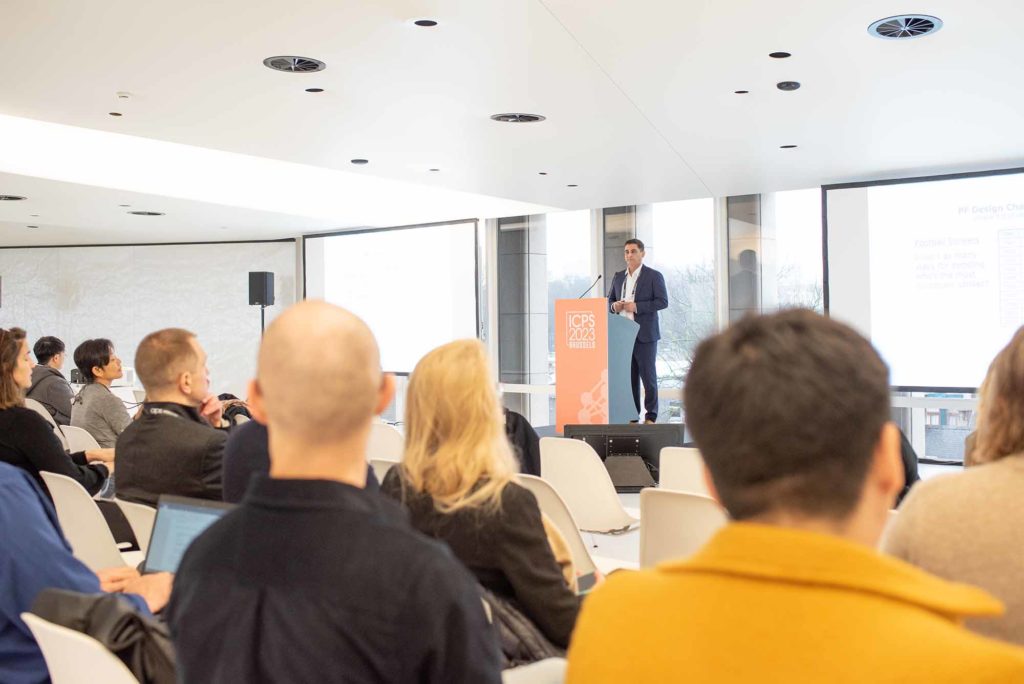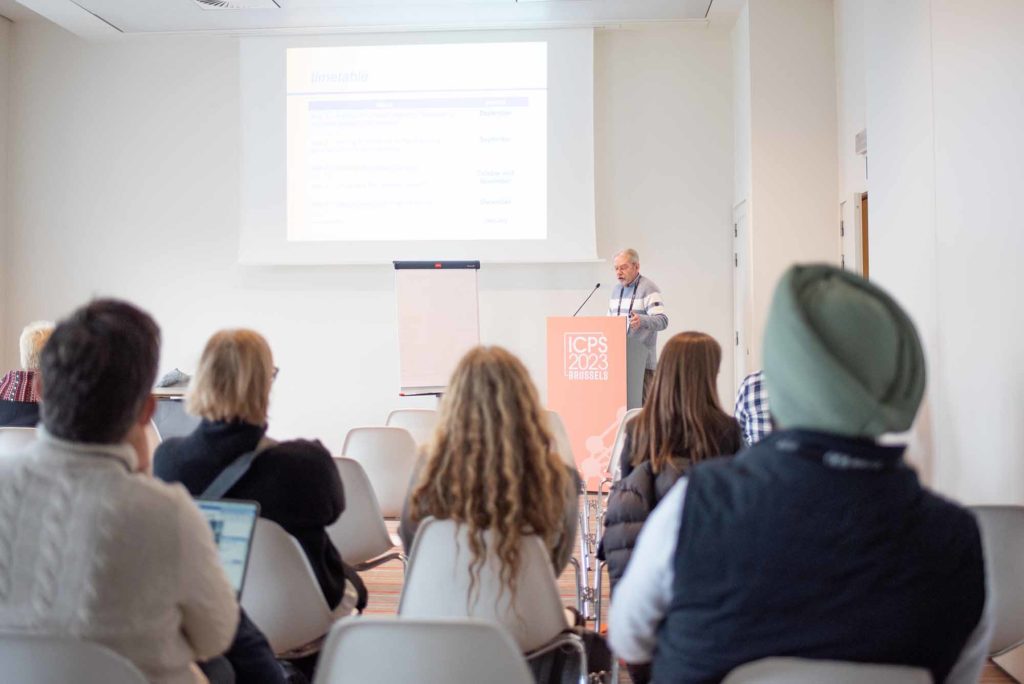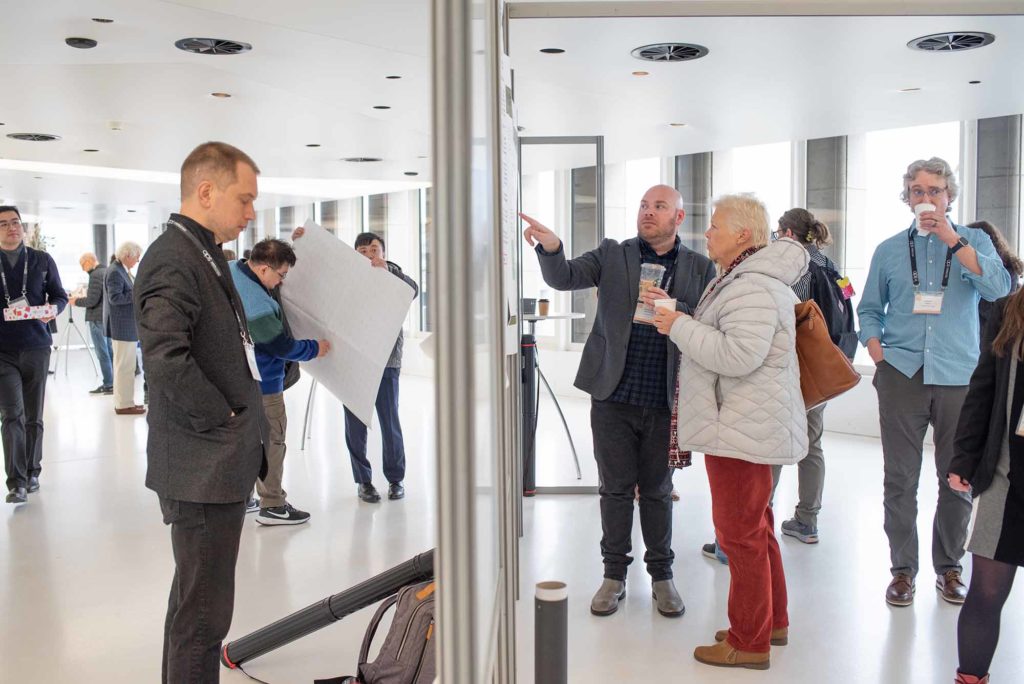APS Spotlight
Productive Failure and the New Frontiers of Psychology Education

Above: Manu Kapur (ETH Zurich) delivered the opening plenary, Teaching and Learning With Productive Failure, at the Teaching Institute during the 2023 APS International Convention of Psychological Science.
Emerging lecture formats, learning strategies, and hybrid teaching models are transforming psychology instruction. At the preconvention Teaching Institute, a day-long program prior to APS’s 2023 International Convention of Psychological Science in Brussels, several dozen teachers of psychology from around the world learned from experts and peers how novel empirical approaches might strengthen their own teaching—and maybe even help underachieving students have fun while discovering “crazy solutions” (in the words of one speaker) to problems that seemed unsolvable.
Held March 9, the ICPS Teaching Institute was sponsored by APS, the Society for the Teaching of Psychology, and the APS Fund for Teaching and Public Understanding of Psychological Science. The organizers were APS Fellows Douglas A. Bernstein (University of South Florida) and Bernard Rimé (Université Catholique de Louvain).
Learning from failures: A new instructional method
In the opening plenary, Teaching and Learning With Productive Failure, Manu Kapur (ETH Zurich) contrasted the conventional direct-instruction model, in which students receive instruction via lectures and apply what they learn to problem solving, with an alternative model that encourages students to explore problems creatively before they learn the solutions. This model intentionally designs instruction for productive failure: The problems are unsolvable if students apply their current knowledge, and only after attempting and failing to creatively solve the problems do they receive the instruction needed to solve them.
Productive failure leads to better learning and an increased ability to transfer knowledge to different problems, Kapur argued. He outlined an example in which students in eighth and ninth grade were asked to invent as many ways as possible to identify the most consistent striker on a soccer team. They “came up with many creative approaches and some crazy solutions” that helped them learn, especially when they generated their own “failures” or wrong answers, he said. Moreover, even reviewing other students’ wrong solutions appears to have benefits beyond the traditional method of instruction, Kapur said, citing a Chinese proverb: “Smart people learn from their own mistakes, but wise people learn from others’ mistakes.” However, he added the caveat that higher achievers and young children appear to be more resistant to and benefit less from this method, he added.

A core learning mechanism underlying productive failure is activation of knowledge, which helps students become aware of the knowledge gap between what they know and what is needed to solve the problem, which can increase their interest in and motivation to identify solutions. Differentiation, the other core mechanism, helps students contrast incorrect and correct applications of knowledge, Kapur explained.
The Teaching Institute also featured a number of other presentations and poster discussions.
- Team-Based Active Learning of Research Methods: Whereas students taught through traditional learning methods are often able to recite knowledge but not apply it, team-based active learning appears to give students the tools to better apply their knowledge. Rimé shared a study in which small teams of students, coordinated by a volunteer master’s student, worked through a five-step process to present a research project. At the end of the semester, each team delivered team reports, answered questions prepared by the instructor and the coordinator, and received a group grade. Students also took an exam individually. Results indicated that individual grades correlated with group grades, and students’ grades overall improved relative to the traditional instructional method. Moreover, team-based active learning appeared to enrich the social and intellectual life of the department.
- Best Practices for Helping Students Identify Misinformation and Correct Misconceptions: Lisa Fazio (Vanderbilt University) discussed current research on debunking misinformation and the implications for correcting students’ misconceptions about psychology. She also covered digital media literacy strategies designed for college students and quick ways to verify suspicious information.
- The Michigan Skills Project: Changing the Way Students Learn About (and Use) Self-Control: This project asks whether students can learn the science of self-control and whether this knowledge has implications for their academic performance and well-being. A team of researchers partnered with classroom teachers to develop a high school curriculum that addressed three key questions: What is self-control and why is important? What are the building blocks of self-control? How do you put these principles into action? Ethan Kross (University of Michigan) and Ariana Orvell (Bryn Mawr College) discussed the challenges of translating psychological science into curricula and how best to involve key stakeholders. They also reviewed the results of the intervention on students’ self-control knowledge, use of strategies, and academic achievement.
- Teaching Psychology at Scale: Psychology, Big Data, and Technology: APS William James Award recipient James W. Pennebaker (University of Texas at Austin) discussed a synchronous massive online course he created with colleague Sam Gosling in the format of a recorded TV show, “Psychology LIVE,” that students could stream. Pennebaker and Gosling quizzed students daily and fostered a sense of community via chat groups and other methods. This lecture format improved students’ grades and reduced the socioeconomic performance gap. Repeated testing combined with students’ active engagement likely contributed to the positive effects, Pennebaker said. Using big-data methods, the researchers could also track when students were online, their clicking behavior, and other variables and analyze how these factors possibly influenced learning.

- Disseminating Knowledge of Psychological Science Via Massive Open Online Courses: Stephanie Demoulin (Université Catholique de Louvain) analyzed the advantages and disadvantages of teaching psychology in a MOOC format and discussed the future of hybrid forms of teaching that combine face-to-face and distance-learning formats.
- Teaching Industrial, Work and Organizational Psychology Through the Lenses of Sustainability Objectives: Zeynep Aycan (Koç University) spoke about her experience redesigning an industrial, work, and organizational psychology (IWOP) course to train researchers and practitioners to be change agents toward achieving United Nations’ sustainable development goals such as responsible production and consumption. Students learned to modify classical IWOP practices in job analysis, recruitment and selection, performance appraisal, motivation, and leadership to address emerging trends in a way that contributes to sustainability objectives. The course began with a discussion of the wide scope of IWOP and then familiarized students with the changing nature of work and emerging trends such as hybrid work, the gig economy, digital transformation and artificial intelligence, non-hierarchical organizational structures, and diversity and inclusion programs.
In the closing plenary, Why Student Evaluations of Teaching Are Higher Education’s Highway to Hell, Bob Uttl (Mount Royal University) showed data debunking student evaluations of teaching (SETs) as valid measures of teaching quality and effectiveness, despite being cheap, convenient, and useful for public accountability, and possibly signaling that students have a say.
SETs are affected by “teaching effectiveness irrelevant factors,” Uttl argued. For example, quantitative courses (e.g., math) tend to receive lower SETs than nonquantitative courses (e.g., English); students’ interest and motivation in a course and their prior knowledge about the course can affect SETs; and as class sizes increase, SETs tend to decrease. Moreover, students’ prejudices can influence SETs, as can teachers’ characteristics that do not influence learning, such as national origin, ethnicity, accent, physical attractiveness, and approachability.
A more fair and valid alternative to SETs, Uttl proposed, are student surveys that ask about teachers’ objective behaviors (e.g., showing up for class, providing grading rubrics, completing tasks within the specified time, etc.) and thus raise alarms about potential teaching problems on the basis of objectively verifiable facts.
“SETs are invalid measures of teaching effectiveness, biased in numerous ways, unscientific, irredeemable, harmful to higher education, and, in part or together with other factors, responsible for the decline of higher education,” Uttl said.
The 2023 ICPS Teaching Institute also featured poster presentations on topics including service learning, intercultural competence, critical thinking, and gamification.
APS 2023 offers a number of educational sessions on the teaching of psychological science. In addition to the annual Teaching Institute preconference, the Society for the Teaching of Psychology Talks and the APS-David Myers Distinguished Lecture on the Science and Craft of Teaching Psychological Science will take place on Friday, May 26.
he 2023 APS-STP Teaching Institute is sponsored by the Association for Psychological Science (APS) and the Society for the Teaching of Psychology (STP). The program offers informative talks and practical advice from experts on the teaching of psychology. The Teaching Institute begins with an evening workshop on Wednesday, May 24, and continues with a day-long program on Thursday, May 25. See our exciting lineup of speakers!
See more APS resources related to the teaching of psychological science. APS 2023 (Washington, D.C., May 25-28) will also feature various programs related to the teaching of psychology. Learn about teaching programs.
Feedback on this article? Email apsobserver@psychologicalscience.org or login to comment. Interested in writing for us? Read our contributor guidelines.





APS regularly opens certain online articles for discussion on our website. Effective February 2021, you must be a logged-in APS member to post comments. By posting a comment, you agree to our Community Guidelines and the display of your profile information, including your name and affiliation. Any opinions, findings, conclusions, or recommendations present in article comments are those of the writers and do not necessarily reflect the views of APS or the article’s author. For more information, please see our Community Guidelines.
Please login with your APS account to comment.